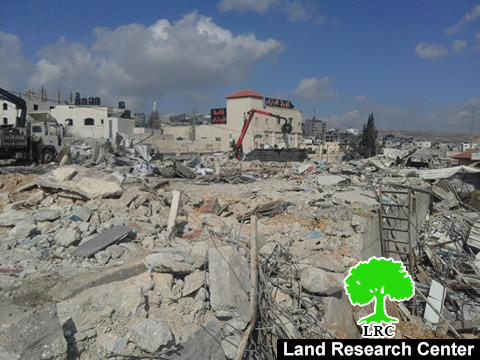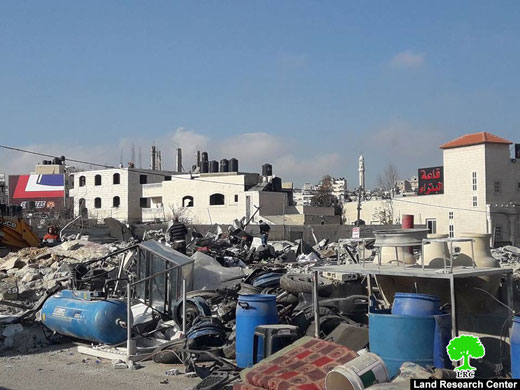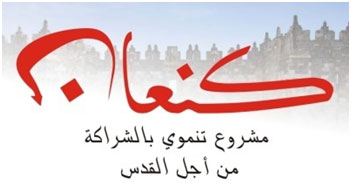2017-01-17
Israeli Occupation Forces demolish structures in Qalandiya Refugee Camp, north Jerusalem
A massive force from Israeli Occupation Army backed by Israel Border Police raided on January 17, 2017 Qalandiya Refugee Camp, north Jerusalem city and carried out a wide-range demolition operation.
According to witnesses, vehicles of the occupation army raided the camp at night and clashes erupted between the residents and soldiers; fire gas and live ammunitions were fired at time. Four hours later, another force raided the camp backed by four military dozers and carried out a demolition operation that targeted several workshops and stores.
The demolished residences were reported as follows:
1. Three stores of home appliances and fridge parts:
It should be marked that demolished stores belong to Hasan Shawamreh, who is a father of 16 member family including 12 children.
The demolished stores totaled 120m2 in area; they were built by cement bricks 11 years ago.
Hasan told Land Research Center the following:
"In 2009, I received a stop-work order on the stores. It is when I sought attorney Samer Basheer to follow up on my case. The attorney managed to delay the demolition for a while. I thought it was over but the occupation forces surprised me today and carried out the demolition"
2. Leveling a car dealer yard that belongs to the following:
* Ashraf Tamami, who is a head of seven member family including 5 children
* Sameer Awawdeh, who is a head of six member family including 4 children.
It should be marked that the ravaged plot was used as a car dealer yard. The attacking force also demolished two rooms (40m2) that were used as offices in addition to a kitchen and restroom (10m2).
Sameer told Land Research Center that Israeli Occupation Forces served him a stop-work order in 2009. It is when he sought an attorney to defend his case in Israeli courts. After years of the order being served, the occupation forces came to the location today, allowed us to evacuate cars and ravaged the yard.
3. Demolition of two stores for motorcycles parts:
The demolished stores belong to citizen Hisham Jewlani, who is married and father of four, two of which are children.
The stores are reported to be built by cement bricks and are of 120m2 in area.
Noteworthy, seven motorcycles belonging to different costumers were destroyed under the rubbles of the demolished stores.
4. Demolition of a building that consists of 11 commercial stores:
The demolished building is owned by citizen Majid Salah Ed-Deen. The stores specialized in cars maintenance have been built nine years ago. Noteworthy, the stores are leased to the following:
- Osama Al-Shanab: 7 Car parts store, Car repair workshop, Carwash.
- Sami Sahouri: Car repair workshop.
- Citizen Majid Salah Ed-Deen : Car repair workshop.
- Hamoudeh Badawi: Mechanic workshop.
- Citizen Majid Salah Ed-Deen: Car repair workshop.
5. demolition of two commercial structures:
The two structures are reported owned by citizen Nafez Fayyaleh, who is the head of a six member family including three children.
Citizen Nafez told Land Research Center that the two shops were built three years ago. The first store is a vegetable ones (40m2) where the second one (20m2) is sandwiches restaurant.
It should be noted that the demolition lasted until dawn. Meanwhile, the occupation forces fired live ammunitions and teargas and stun grenades at the camp's residents. As a result, two trucks parked at the entrance of the camp got torched and some youth sustained injuries.


Land Research Center LRC sees that demolitions contradict with all of the International conventions and Humanitarian laws including:
- Article 17 of the (1948) Universal Declaration of Human Rights stating: “Everyone has the right to own property alone as well as in association with others. No one shall be arbitrarily deprived of his property.”
- Section ‹G› of article 23 of the (1907) The Hague Conventions asserting: “In addition to the prohibitions provided by special Conventions, it is especially forbidden to destroy or seize the enemy's property, unless such destruction or seizure be imperatively demanded by the necessities of war.”
- Article 53 of the Geneva Fourth Convention (1948) declaring: “Any destruction by the Occupying Power of real or personal property belonging individually or collectively to private persons, or to the State, or to other public authorities, or to social or cooperative organizations, is prohibited, except where such destruction is rendered absolutely necessary by military operations.”
- Section 1, Article 11 of the International Covenant on Economic, Social and Cultural Rights (1966): “The States Parties to the present Covenant recognize the right of everyone to an adequate standard of living for himself and his family, including adequate food, clothing and housing, and to the continuous improvement of living conditions. The States Parties will take appropriate steps to ensure the realization of this right, recognizing to this effect the essential importance of international co-operation based on free consent."

This case study is part of Kan'aan Project
